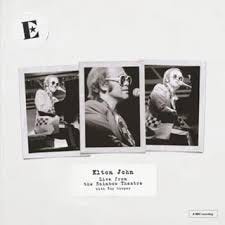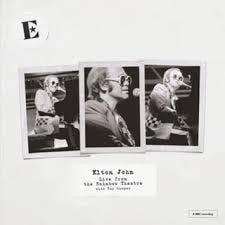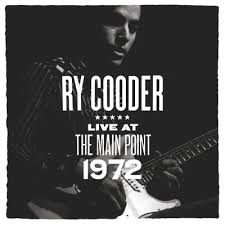Elton, Ry, Chrissy: Further Discoveries from Record Store Day
A tiny sampling from what some collectors regard as the best RSD in years....
Elton John: Live at the Rainbow Theater with Ray Cooper.
Many frequently-bootlegged artists use Record Store Day releases to clarify odd unexplained asterisks of the discography, or to bring out “official” versions of performances that have circulated informally. This year’s entry from Elton John (Sir Elton to you) offers an excellent example of how to do this cleverly: Live at the Rainbow Theater With Ray Cooper is a single-LP culling from a six-night run he and his longtime percussionist did in 1977, a configuration that has long been an obsession among John’s fans.
The shows were the duo’s first, a test-run of sorts for what became an extensive tour two years later. They have been circulated, in pressings of variable sonic quality, since. Most of the unauthorized versions contain a healthy representation of hits (“Your Song,” “Daniel”); John’s version eliminates those to focus on album tracks (“Ticking” from 1974’s Caribou) and live debuts of new songs – among them “Roy Rogers,” “Idol,” “I Feel Like A Bullet (In The Gun Of Robert Ford)” and the stupendous “Cage the Songbird.” (How was this one not a hit?).
The curation discussed above, in this “unboxing” video (for a *record?*) makes a persuasive argument about the richness of John’s albums (including those on the then-current, perhaps unfairly maligned 1976 Blue Moves). At the same time, the intimate setting suggests that the layered, wide-screen scope of the studio arrangements sometimes overwhelmed the songs themselves – check the simple reading of “Idol,” with Cooper on vibraphone, in which John sidesteps the default rock-ballad majesty to spotlight a quality that’s nearly always present in the songs he wrote with Bernie Taupin: Humanity.
In the course of his marathon multifaceted career as a recording artist, the composer and multi-instrumentalist Ry Cooder has attracted several distinct constituencies. Those who revere his expansive film soundtracks (Paris, Texas) are likely not the same people who love his intimate collaborations with traditional musicians from around the world (A Meeting Across The River, featuring V.M. Bhatt, Talking Timbuktu with Ali Farka Toure), or his extended explorations into Cuban song from the mid-20th century, which gave us Buena Vista Social Club as well as kitschy genre-smashups (like Mambo Sinuendo, the joyful mambo-surf collaboration with Cuban guitarist Manuel Galban from 2003).
The period of Cooder’s career that deserves a smidge more attention comes before all that – when he was a solo performer specializing in gospel, folk and mostly blues covers. Alternating between serene finger-picked chords and graceful slaloming slide leads, Cooder shook listeners with his playing, which was simultaneously literate and primal, and his traveling-showman stories involving semi-prominent blues players he’d encountered.
Live at the Main Point 1972 was recorded with an attentive audience in a club outside of Philadelphia, during Cooder’s tour to support his third solo album Boomer’s Story. (The above video, which features a Warner promo-only release from 1972, contains four songs from the Main Point performance, which unfortunately has not been officially shared via streaming, nor received “unboxing” treatment from YouTube record collectors.)
The set presents Cooder as an irreverent blues believer – one who could joke about the genre’s odd lingo (“Diddy Wah Diddy”), then scramble every last blues-guitar cliché into a sound of enduring truth. His playing is spare and severe — it’s as though he’s seeking balance between raconteur-mode vocals and the serious work he’s doing on the guitar. At this point Cooder was just hitting his stride – after this tour he created what many regard as his finest solo work, 1974’s Paradise and Lunch – and after that, in 1976, came another essential statement, Chicken Skin Music. This short set glimpses the latent DNA of that soon-come greatness.
Chrissy Zebby Tembo and Ngozi Family: I’m Not Made of Iron
Cue up “Well Up People” to encounter a potent distillation of Zamrock – the unlikely sound that exploded in Zambia during the 1970s. The track starts with a repeating phrase from heavily fuzzed-out electric guitar, soon drummer Chrissy Zebby Tembo enters with a rudimentary 4/4 pattern that gathers intensity as it goes along. There’s lots of repetition. The vocals are more spoken than sung. Somehow, though, the tune connects dots we didn’t know needed connecting, establishing links between bands like Black Sabbath and instrumentalists like Tembo, juxtaposing the universal garage rock impulse to the rhythmic nuance that defines African music.
Recorded in 1977, I’m Not Made of Iron was the second effort by Tembo, the longtime drummer of the pioneering Ngozi Family. It was never commercially released. LA-based Now/Again Records has been studying Zamrock, searching for lost treasures and reissuing Zamrock LPs for years – from the Bandcamp link above, it’s a short hop to several eye-opening compilations as well as the Ngozi Family’s terrific, surprisingly psychedelic discography.






